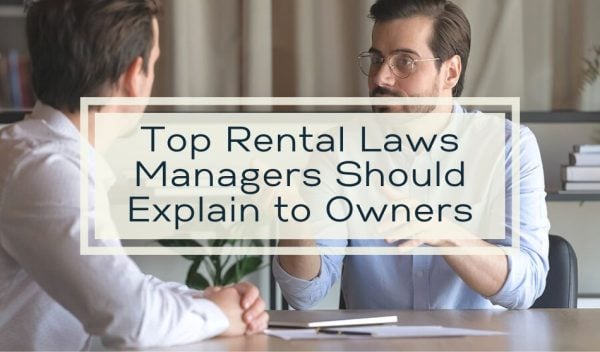
Between learning landlord-tenant laws, managing tenant relationships, property maintenance, and financial tasks, managing a rental property is a big task.
It’s no wonder that property investors are eager to hand over the reins to a seasoned property manager. While a great property manager can make an owner’s job easy, there is still essential information that an owner should know. As a property manager, giving your owner this information can ensure that you and your property owners are on the same page and are able to provide excellent service to your client’s tenants. It can also prevent uncomfortable (or illegal) suggestions or situations.
Naturally, any procedures and vital details should be outlined in your management agreement with your owners. However, providing a cheat sheet of information regarding top rental laws can ensure that your owners know about these policies long before an issue arises.
Top Rental Laws You Should Know as a Property Owner
Notice of Entry:
As an owner of a property, you may expect to make repairs or check in as you see fit. However, a property manager’s job is to assess this need and the condition of the property. Moreover, your local laws require that tenants receive ample notice of a visit–with exceptions made only for emergencies. For this reason, it is vital that owners do not show up at the property for surprise inspections or to perform maintenance unexpectedly. Property owners must remember that tenants have the right to the implied warranty of quiet enjoyment of the property, and any concerns should be addressed with the property manager, who can then can coordinate with the tenant. Otherwise, you could be infringing on your tenants’ rights.
Learn more: Right to Implied Warranty or Covenant of Quiet Enjoyment | Clause Breaches & More
Security Deposits Must Be Saved:
If you hold onto your tenant’s security deposit; it might be tempting to dip into those funds to cover expenditures or general maintenance during their tenancy. Unfortunately, this is not an appropriate use of the security deposit funds; you cannot assume that your tenant will not receive their deposit at the end of their tenancy. Every state has different state laws regarding security deposits, and each state has its own regulations about what can reasonably be deducted from the deposit. Overall, it is best practice to allow your property manager to securely store those funds in a separate account so that they are readily available when your tenant is ready to move out.
Learn more: Security Deposit Laws, Limits & Deadlines – State Guide for Rentals
Habitability Requirements:
Property managers may take care of your day-to-day operations for your investment property, but as an owner, you will still have some key responsibilities. Along with your property manager, you are responsible for maintaining a safe and habitable environment for your tenants. This means that owners should expect to have a reserve of funds that can be used to cover any immediate threats to habitability; this will include repairs to essential services and may include covering the costs for alternative living arrangements in accordance with your state’s laws.
Your property manager will also advise on needed updates or maintenance to prevent a spendy repair down the road. Additionally, make sure you have adequate insurance coverage on your rental property. Remember that homeowners insurance and rental property insurance is not the same, and protecting your investment will require having the right insurance for your rental property. This will help you to restore your property in the event that damage to the dwelling occurs.
While each state will have its own requirements for habitability, the essential services listed below can be used as a springboard to assess where emergent repairs may be needed. Be ready to provide your property manager with the funds to address any of the following issues.
Your property may be considered uninhabitable if it severely lacks:
- Effective waterproofing and weather protection
- Effective and safe plumbing:
- Hot and cold water
- Safe drinking water
- Water that is connected to a sewage disposal system
- Plumbing facilities are in working order
- Adequate heating facilities
- Depending on local laws and climate: Cooling facilities may also be required
- Working electrical lighting, wiring, and equipment
- Clean and sanitary conditions
- Floors, walls, ceiling, stairways, and railing maintained in good repair
- Safety from fire hazards
- Working smoke and carbon monoxide alarms
- Working locks
Learn more: What is the Implied Warranty of Habitability for Rentals?
Anti-Discrimination Rules:
The task of picking a tenant is up to the property manager, who has an in-depth understanding of both tenant screening best practices and fair housing laws. Owners and investors are naturally eager to protect their investments and may have strong opinions about who the ideal tenant could be, but owners should be made aware that picking the right tenant is in the property manager’s purview and that fair housing laws mean that owners cannot request preferential treatment in regards to any protected class.
The Federal Fair Housing Act recognizes these protected classes:
- Race
- Color
- Religion
- Sex
- Familial Status
- Disability
- National Origin
Federal law recognizes specific protected classes, but your state may have additional guidelines that could include marital status, age, or other protections.
Learn more: The Fair Housing Act: Anti-Discrimination Laws for Landlords and Property Managers
Owners naturally rely on their property management team’s expertise when it comes to vital decisions regarding their rental property. While a property manager should be versed in all rental laws, owners can greatly benefit from having a general understanding of the crucial laws that will affect how the property management company will operate. Having clear boundaries and a real understanding of their obligations as property owners will ensure smooth sailing and the best return on investment.